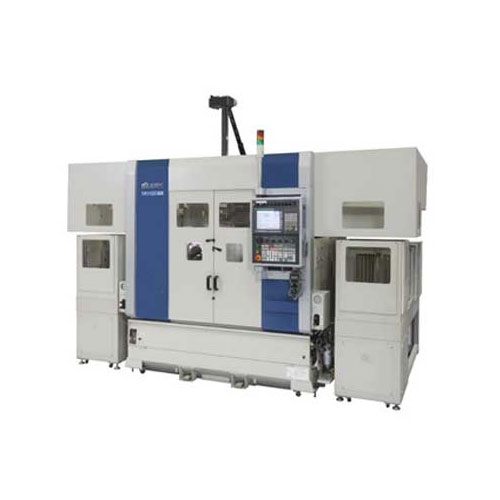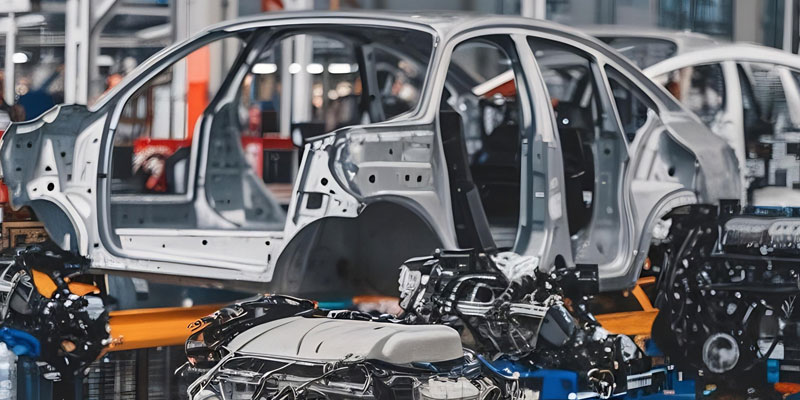Schedule a Call Back
Digitalisation: Reshaping future of manufacturing
 Industry News
Industry News- May 15,20

Organisations have started stepping towards digitalisation, looking at the benefits like increase in sales & profitability due to increased reach, increase in market share, creating & building brand awareness with less cost, fast feedback which enables company to incorporate desired changes by customer, helps in analysing environment & decision making, more satisfied customers along with a more valuable customer insight.
SMEs have started a step towards digitalisation looking at the benefits such as increase in sales & profitability due to increased reach; increase in market share; creating & building brand awareness with less cost; fast feedback which enables company to incorporate desired changes by customer; help in analysing environment & decision making, more satisfied customers along with a more valuable customer insight.
Industry 4.0 is a revolution and digitalisation is aiding automation within the SMEs. Organisations are looking at various systems and processes to drive efficiency and to lower costs. Amid this Covid-19 pandemic, industry has experienced migration of workers to their hometowns.
Automated systems and processes can handle jobs and work even with reduced workforce. Thus, automation can be a shield to the companies who have automated their processes in the current time.
Considering this background, Industrial Products Finder (IPF) hosted a webinar titled- How to use digitalisation to drive efficiency? on May 14 to discuss strategy on leveraging digitalisation for bringing efficiency among the SMEs in India and overall industry.
The webinar - which was moderated by Priyanka Padode Seth, Business Head- Digital, ASAPP Info Global Group - included panellists like Anup Wadhwa, Director, Automation Industry Association (AIA); Mohini Kelkar, Director, Grind Master Machines Pvt Ltd; Mudit Agarwal, VP (IT) & CIO, Global IT Head, Uflex Limited; Sameer Gandhi, MD, Omron Automation, India; and Sivaram PV, a Mentor of Centre for Industry 4.0 (C4i4) Lab, Department of Heavy Industry, GoI, and Retired Non-Executive Chairman, B&R Automation India.
Priyanka Padode Sheth, opening the discussion stated, “There are some real concerns to address for SMEs. These include liquidity, investments, knowledge and awareness, and need for adoption."
She also took through some significant things that Indian industries need to do to move to scaling up processes in this new 'Data Era'.
Digitalisation: Reshaping future
Digitalisation and automation will unleash three important things such as knowledge barriers will dissolve; ability to predict with reliability and the ability to analyse; and strengthening the decision-maker or the role holder to act quickly with precision. This is known as ‘smart manufacturing’.
Further adding about customer benefits, Anup Wadhwa stated, “Customers will be able to get custoimised products. Customers are always in need of three things- quality, delivery and the cost. It will also benefit customer to get fabricated supplies to suit their dimensions. The real beauty is when customers gets a feel of their product getting manufactured in real-time.â€Â
Digitalisation challenges
India stands in a position where comparison is not possible. It is not an overnight change, rather will happen gradually. Clearing doubts and misconceptions over technology adoption is an important task where many associations and bodies are striving to propagate digitalisation benefits.
Shivaram PV stated, “India is a different country than its other Asian counterparts. India has huge population which on one hand provides a very big market for us, but on the other it can’t be leveraged to use them in our factories. There is a large proportion who is very unskilled.
“The challenge is to convert unskilled people into skilled workforce which is significant in making digitisation a big success and thereby making Indian manufacturing smart. There is a huge gap in what customers want and what industries can actually deliver. This gap can be reduced considerably with digialtisation. With digitalisation volume of production can be met with variety of products in a single plant,†added Sivaram.
Indian factories have overall equipment effectiveness (OEE) score of 75 to 85 per cent which can drop more than half if an independent audit is conducted. Many in the industry are meeting their digitalisation needs in a phased or a step-by-step manner. Such a system of adoption of automation does not affect company’s processes and also helps its workforce to learn about the new systems.
This is the right time to upgrade to digitisation and automation. If industries don’t do it now, then they will be left behind.
Mohini Kelkar rued, “There are various misconceptions in adopting automation and digitalisation in the process. Some key misconceptions are such as high cost, reduces number of operators, it is only adopted to reduce operators to auto-tune processes. In real, it improves the quality, predictability and assurance. It can be your quality assurance system. If we are looking at doing it in parts, which some Chinese companies have done. Having automation and digitalisation will help you meet global standards. A fruit of this new technology is that of traceability. It helps to trace back to know where, when and on which process the product is produced.â€Â
A poll held during the webinar gauged biggest hurdles for companies while adopting automation and digital solutions. Industry felt that lack of understanding of the technology and it's applications is the foremost concern followed by lack of availability of the of the technology and vendors or the lack of skilled manpower to implement run and maintain automated and digital system. Lastly, a small share of them voted for upfront cost.
Benefits of digitalisation and automation
This technology brings predictability of operations, ensuring the availability of machinery and improves the efficiency in production. This helps to maintain machinery for efficient machine building and maintenance.
Mudit Agarwal highlights, “Another such area is process automation. The processes which are manual can be automated. It brings down errors. When we talk about digitalisation in manufacturing, there are two elements- IT and the operations team (OT). OT takes care of the operations and maintenance. These two elements have never really worked together in the past. In the digitisation scenario, we are trying to bring them together. It is very important that the organisations realise that the two elements should be structured in a way that it supports the organisation together.
Quality and precision
There is an increased emphasis on Make In India. In order to plug into the global supply chain, digitalisation and automation is essential. Post Covid-19, the Indian industry have a chance to get grab a greater share of this restructured global supply chain. Industries shall produce with quality and at higher productivity.
Sameer Gandhi stated, “The automotive industry has been an early adopter of digitalisation because of their structured manufacturing process. After automotive, it is pharma, food and beverages, and the FMCG industries that are catching up. MSMEs are too catching up on digitalisation.â€Â
This Covid 19 situation has brought global players and companies and Indian industry on a same level. Post Covid 19, it is an opportunity for the Indian industry. Problems like labour shortage and changing manufacturing processes will push SMEs for automation and digitalisation.
“Our exported products are automation-friendly and seamlessly integrate with the system. With change in manufacturing, factory assemblies are automating. Predictive maintenance is a solid arm of digitisation. It can help to keep a check over the wear and tear of the tools, components and replace them in time before they bring the whole process to a stop,†Mohini Kelkar points out.
Another poll conducted during the webinar looked at - which functional areas or divisions can benefit the most from digitalisation? The poll results stated that marketing and promotion benefits the most and comes out a winner. The second was production followed by distribution & logistics, sales, and lastly procurement.
In today’s world where everyone in the supply chain are upgrading, it is relevant for Indian industries to upgrade. This gives a visibility to the entire supply chain and to the delivery chain over the logistics for more than just vehicles.
In an unclear market situation like today, post Covid 19 industry will be unaware about which products to be manufactured. Industry should be ready if any new kind of product pops up. It can be produced with some minor changes. These changes will be programatic. Some existing processes can be efficiently used for the newer products too as the workflows are already set. Therefore, it is mportant that at this stage industries should be available before the market to grab its potential customers. If you don't grab it, somebody else would. The global supply chains are going to change, suppose they opt for local sourcing, SMEs should be ready. Earlier calculations of price competitiveness and so on do not apply anymore because there are other restrictions.
Tips for cost-effective adoption
- Start small but think big. Device a long term strategy and start with phased adoption. This way cost is reduced. Improve productivity and one way to do that would be to prepare for a high level of unpredictability. In this volatile and unpredictable market whatever is invested should offer high amount of flexibility, allowing to focus even in an extremely agile environment.
- Need for a real-time and accurate transparent OEE measurement system.
- Investments shall be made where companies are most fragile so that other processes too get dedicated attention.
- If an SME player is running out of fund and cannot invest much, phased manner approach should be considered.
- Automate repetative tasks first. Further, with better investments improve your complex processes.
- Some simple processes may help in other benefits like saving water, electricity, fuel etc shall also be considered by SMEs.
Related Stories

AI on the edge will transform the shop floor: Sameer Gandhi
In this interview with Rakesh Rao, Sameer Gandhi, MD, OMRON Automation Pvt Ltd, elaborates on trends and opportunities as the manufacturing sector opts for data-led decision-making, quality and safe..
Read more
Can AI be the game changer for Indian manufacturers?
While manpower issues and quality are driving adoption of industrial automation, cost and lack of knowledge are causing hindrances. Artificial intelligence (AI) can be the game changer, writes Rakes..
Read more
IMTMA’s MTX Connect Jamshedpur to showcase latest machine tool technologies
IMTMA and CII will host the third edition of MTX Connect in Jamshedpur on 3–4 November 2025, offering machine tool makers a platform to connect with industries across eastern India.
Read moreRelated Products

Compact Fmc - Motorum 3048tg With Fs2512
Meiban Engineering Technologies Pvt Ltd offers a wide range of Compact FMC - Motorum 3048TG with FS2512.

Digital Colony Counter
Rising Sun Enterprises supplies digital colony counter.
Robotic Welding SPM
Primo Automation Systems Pvt. Ltd. manufactures, supplies and exports robotic welding SPM.















